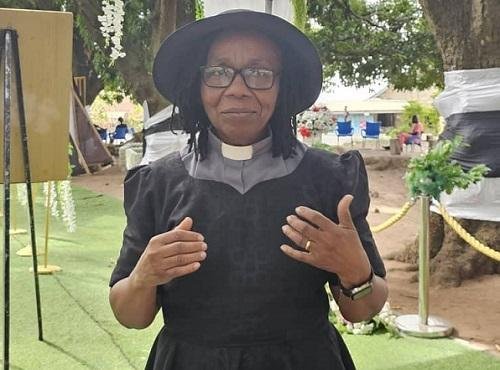Hot!
Don’t copy blindly, make decent dressing hallmark

Rev Prof Dorothy Akoto
The Vice President of the Trinity Theological Seminary, Legon, in the Greater Accra region, Rev. Prof. Dorothy B.E.A. Akoto has expressed concern about indecent dressing among females in recent times.
She said the fact that the trend was not just about the youth but even among older people was more worrying because they are expected to set good examples for the younger ones.
Speaking in an interview with The Spectator on Saturday, Rev. Prof. Akoto observed that the level of exposure of important body parts had become common at gatherings.
She said dressing decently and appropriately to functions was important so that they do not become nuisance to others and questioned why men covers up their bodies and the women rather expose them.
Rev. Prof. Akoto said it was about time females rethink and make decency a hallmark.
She advised parents especially mothers to set good examples for their children by encouraging them to dress well when they are going out of their homes.
The Vice President of the Seminary said, people must know that, they did not have to copy blindly or do what others were doing just to be relevant.
She also advised that persons who use social media should be careful so that they do not imitate what could be harmful to them and the society in future.
She revealed that, some persons had become victims of drug abuse, sexual immorality, alcoholism among others just because they wanted to be like others.
Rev Prof Akoto also urged children to be obedient to their parents and the elderly.
She explained that sometimes as children grew up, there was the tendency to feel that they know it all and so would not want to do as they were told but go their own ways.
That, she said, had led to the destruction of many, explaining that on many occasions parents advised their children not to do things a certain way because of their experience over the years.
She also advised parents to make their children their friends so that they would be able to freely approach them about their problems in life to receive the right directions so that they do not stray.
From Dzifa Tetteh Tay, Tema
Hot!
Is the “Rev” title biblical?

In many Ghanaian churches, pastors are often introduced as “Reverend” or simply “Rev.”
The title is seen as a mark of respect, yet its biblical basis continues to stir debate.
While some Christians argue that it is a harmless way to honour church leaders, others insist it is unbiblical and should not be used at all.
Those who question the title usually point to the Bible itself. Nowhere in Scripture did Jesus or the apostles use “Reverend” for themselves or for one another.
Instead, they addressed each other as “brother” or “servant.” In Matthew 23, Jesus even warned his followers not to seek titles such as “rabbi” or “father,” teaching that all believers are equal under one God.
Critics also note that Psalm 111:9 describes God’s name alone as “holy and reverend” in the King James Bible.
To them, this means the word should be reserved for God, not for human beings. Others go further, citing Job 32, which cautions against giving flattering titles to men.
For such voices, the modern use of “Reverend” risks elevating pastors beyond what the Bible prescribes.
On the other hand, defenders of the title argue that it is not meant to replace God’s reverence but simply to acknowledge a minister’s role.
In many churches, “Reverend” is given to ordained ministers who have undergone training, much like the way a doctor is addressed as “Dr.”
The Bible itself, they point out, encourages believers to honour their leaders, with 1 Timothy 5:17 stating that elders who direct the affairs of the church well are “worthy of double honour.”
In this sense, the title is seen as a formal courtesy rather than a theological statement.
Supporters remind critics that Christianity does not operate in a vacuum but within cultural settings.
In Ghanaian society, respect for elders and authority is central to social order. Just as chiefs are addressed with titles such as “Nana” or “Togbe,” many Christians believe it is fitting to extend a similar courtesy to church leaders.
In their view, calling a pastor “Reverend” reflects Ghanaian values of honour and respect, and does not amount to worshipping a human being.
Yet the debate is far from settled. Some argue that the title has been abused, with individuals presenting themselves as “Reverend” without any proper training or accountability.
Calls have even been made for the regulation of church titles to prevent confusion and protect the credibility of ministry. Others, however, see no harm in its continued use, so long as it is not taken beyond what Scripture allows.
At the heart of the matter lies a bigger question: should Christians stick strictly to biblical language when addressing their leaders, or is it acceptable to adapt titles as society evolves?
The conversation is not just theological but cultural, touching on how Ghana balances respect for tradition with the authority of Scripture.
The debate over the “Rev” title is therefore not one with easy answers. What is clear, however, is that it forces us to reflect on how we show honour, how we interpret the Bible, and how faith interacts with our cultural practices.
As the discussion continues in church pews and on social platforms, we ask you: should pastors and ministers be called “Reverend,” or should Christians abandon the title altogether?
By: Jacob Aggrey
Hot!
Police confirm arrest of two suspects in Asankrangwa murder case

The Western Central Regional Police Command has confirmed the arrest of two men in connection with the fatal stabbing of a 20-year-old man at the Asankrangwa Education Area on Sunday, August 17, 2025.
In a statement signed by the Head of the Public Affairs Unit, ASP Beatrice Turkson, the police said preliminary investigations revealed that the deceased was chased and stabbed multiple times by a group of people.
The incident is believed to have stemmed from a misunderstanding between the deceased and one of the suspects, identified as 36-year-old Kwasi Opong.
According to the police, swift action led to the arrest of Opong and another suspect, 23-year-old William Francis Osei. Both are currently in custody assisting with investigations, while efforts are underway to apprehend another suspect who is still on the run.
The police noted that the body of the deceased has been deposited at the Asankrangwa Catholic Hospital morgue for preservation and autopsy.
“The Command assures the public that all persons connected to this heinous crime will be brought to justice,” the statement said.
The police appealed to the public to provide any information that could assist in the ongoing investigations.
By: Jacob Aggrey






